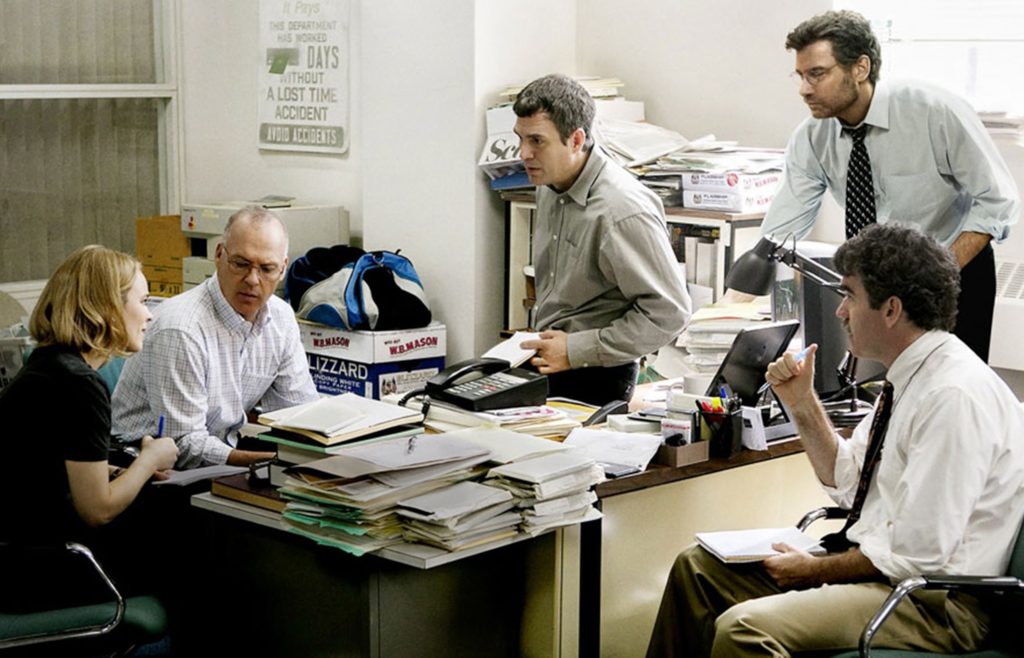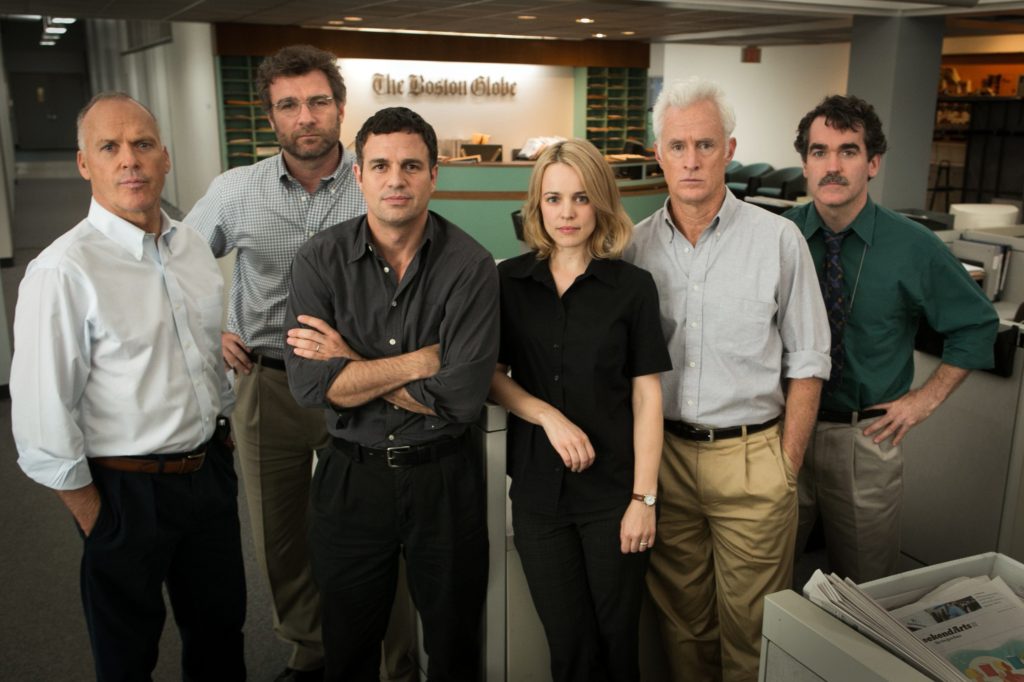Spotlight (2015)
CAST: Michael Keaton, Mark Ruffalo, Rachel McAdams, Liev Schreiber, John Slattery, Brian d’Arcy James, Stanley Tucci
REVIEW:
While the true stories they chronicle have little in common, Spotlight might appeal to those who enjoy the likes of Zodiac; like the earlier film, Spotlight is an unvarnished, no-frills docudrama which places its focus on the details of investigative procedural without relying on overdramatic embellishments or histrionics. To that end, it’s compelling viewing (at least for those who appreciate this kind of movie, which won’t be everyone) and chronicles the origins of the Catholic Church sex abuse scandal we surely all remember seeing on the news.
In July 2001, the “Spotlight” team of investigative journalists at the Boston Globe, led by editor Walter “Robbie” Robinson (Michael Keaton) and including Mike Rezendes (Mark Ruffalo), Sacha Pfeiffer (Rachel McAdams), and Matt Carroll (Brian d’Arcy James), along with their superiors Ben Bradlee Jr. (John Slattery) and Marty Baron (Liev Schreiber), began investigating an alleged cover-up of sexual abuse in the Boston Roman Catholic Church. Initially faced with a handful of cases, the number of accused priests skyrocketed from 4 to 90. After spending months following leads, finding sources (some reluctant to talk), interviewing victims and lawyers, and facing various veiled but less-than-subtle attempts to pressure them into dropping the case, the Spotlight team published the story in early 2002. This was the proverbial kick to the hornet’s nest. The story may have started in Boston, but it was only the tip of the iceberg, and ultimately kickstarted the exposure of a worldwide culture of the church covering up pedophile priests, paying off and pressuring victims to stay silent while shuffling the abusers from parish to parish.
Like Zodiac, the attention is firmly on the investigative team, not the victims or perpetrators. The focus is tight and the drama is spare and terse. There are moments when we step into a courtroom, but this is not a courtroom drama, and the lion’s share takes place in the small, spare Spotlight office. The tension comes not from any conventional “thriller” elements, but from the struggle to goad sources—victims, and lawyers who aided and abetted the church cover-up—to speak about what happened, and the various attempts by church-affiliated persons to put pressure, entreaties, and even veiled threats on the Spotlight team to discourage them from running the story. Much is made of the Catholic Church’s pervasive influence over Boston, and there’s more than a little David vs. Goliath in the way the story unfolds (various outside shots are framed in such a way that churches are looming in the background). There are several penetrating scenes in which the Spotlight team interviews victims of childhood sexual abuse that resist the temptation for melodrama and lay the facts out in unvarnished no-frills fashion. These scenes are disturbing without feeling like they’re reaching for it. There is an eerie sense of verisimilitude; various recognizable Boston locations are prominently featured, lending a strong sense of place, and the interview scenes have a feel of authenticity. While they feature actors reciting scripted dialogue, they could be right at home in the 2006 documentary Deliver Us From Evil covering some of the same subject matter. There’s another quietly impactful moment in which Brian d’Arcy James’ Matt Carroll, compiling a list of pedophile priests, is shocked to realize one lives right around the corner from himself, and promptly posts a note to the fridge warning his kids to steer clear. The 9/11 attacks take place on TV in the background and momentarily derail the church investigation as they take over the news cycle (Rezendes is briefly taken off the story and sent to do a report at the flight school the hijackers attended). There are some background office politics; the Boston Globe is in the midst of a shakeup, with no-nonsense new boss Marty Baron (Liev Schreiber) coming in from Miami with budget and staff cuts in mind, concerned about declining readership and skeptical of how long the Spotlight team takes to find and investigate stories, leaving its longtime editor Robinson worrying about keeping his team alive, but while Baron is initially viewed with wariness by the Spotlight team, he soon proves to be the story’s strongest supporter and in some ways the behind-the-scenes driving force behind the investigation.
 Also like Zodiac, the focus is on procedural, not character development. The characters are secondary to the details of the investigation. We get fleeting glimpses of some of their personal lives but not enough to elevate them to fully fleshed-out individuals. Nevertheless, the ensemble is rock-solid, with everyone acquitting themselves admirably with what they’re given. The most distinctive personalities and most forceful presences on the Spotlight team are Michael Keaton (enjoying his post-Birdman career revival), who plays the cool, collected veteran newsman Robinson with a quiet intensity, and Mark Ruffalo, whose Rezendes is the most gung-ho and driven and the most outwardly emotional; his impassioned outburst two-thirds of the way through is the most forceful acting moment in the movie (according to the real Robinson and Rezendes, Keaton and Ruffalo’s portrayals of them are eerily on-target), but the likes of Rachel McAdams, Brian d’Arcy James, and John Slattery (Roger Sterling to Mad Men fans, the elder Howard Stark to Marvel fans) are uniformly solid in their lower-key roles, as is Liev Schreiber in a subdued performance as the socially awkward but quietly unflappable Marty Baron. Smaller roles include Billy Crudup, Jamey Sheridan, Paul Guilfoyle, and Len Cariou (as Cardinal Bernard Law). The voice of Rezendes’ unseen source over the phone is provided by an uncredited Richard Jenkins. Arguably the standout in the supporting cast is the ever-reliable character actor Stanley Tucci, as the cantankerous victims’ lawyer Mitchell Garabedian.
Also like Zodiac, the focus is on procedural, not character development. The characters are secondary to the details of the investigation. We get fleeting glimpses of some of their personal lives but not enough to elevate them to fully fleshed-out individuals. Nevertheless, the ensemble is rock-solid, with everyone acquitting themselves admirably with what they’re given. The most distinctive personalities and most forceful presences on the Spotlight team are Michael Keaton (enjoying his post-Birdman career revival), who plays the cool, collected veteran newsman Robinson with a quiet intensity, and Mark Ruffalo, whose Rezendes is the most gung-ho and driven and the most outwardly emotional; his impassioned outburst two-thirds of the way through is the most forceful acting moment in the movie (according to the real Robinson and Rezendes, Keaton and Ruffalo’s portrayals of them are eerily on-target), but the likes of Rachel McAdams, Brian d’Arcy James, and John Slattery (Roger Sterling to Mad Men fans, the elder Howard Stark to Marvel fans) are uniformly solid in their lower-key roles, as is Liev Schreiber in a subdued performance as the socially awkward but quietly unflappable Marty Baron. Smaller roles include Billy Crudup, Jamey Sheridan, Paul Guilfoyle, and Len Cariou (as Cardinal Bernard Law). The voice of Rezendes’ unseen source over the phone is provided by an uncredited Richard Jenkins. Arguably the standout in the supporting cast is the ever-reliable character actor Stanley Tucci, as the cantankerous victims’ lawyer Mitchell Garabedian.
Despite dealing with difficult and upsetting subject matter, director Tom McCarthy keeps the emotional tone cool and restrained, resisting milking it for extra drama. Like Spotlight’s stoic leader Robbie Robinson, he understands that the plain simple facts will win the day, and speak for themselves powerfully enough that emotional histrionics are superfluous, even cheapening. The ballooning scandal ultimately led to the resignation of Cardinal Law (though he was controversially only transferred to a high-ranking position in Rome, a move which only further inflamed cries of lack of accountability) and blew the lid off a world-spanning epidemic of sexual abuse that the church had swept under the rug for decades. In a time when there are those who would seek to discredit the free press, Spotlight and the true story it chronicles provides a forceful reminder of what a small team of dedicated professionals accomplished and the scope of what they exposed that if not for their tenacious efforts may have stayed hidden indefinitely. It’s a worthy tribute to a brand of journalism that, at its best, can drag injustices out of the shadows where powerful forces would seek to keep them, and into the Spotlight.
* * *
